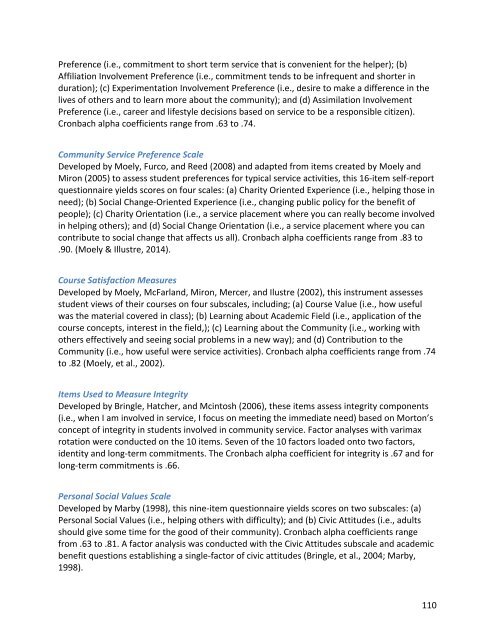A COMPENDIUM OF SCALES for use in the SCHOLARSHIP OF TEACHING AND LEARNING
compscalesstl
compscalesstl
You also want an ePaper? Increase the reach of your titles
YUMPU automatically turns print PDFs into web optimized ePapers that Google loves.
Preference (i.e., commitment to short term service that is convenient <strong>for</strong> <strong>the</strong> helper); (b)<br />
Affiliation Involvement Preference (i.e., commitment tends to be <strong>in</strong>frequent and shorter <strong>in</strong><br />
duration); (c) Experimentation Involvement Preference (i.e., desire to make a difference <strong>in</strong> <strong>the</strong><br />
lives of o<strong>the</strong>rs and to learn more about <strong>the</strong> community); and (d) Assimilation Involvement<br />
Preference (i.e., career and lifestyle decisions based on service to be a responsible citizen).<br />
Cronbach alpha coefficients range from .63 to .74.<br />
Community Service Preference Scale<br />
Developed by Moely, Furco, and Reed (2008) and adapted from items created by Moely and<br />
Miron (2005) to assess student preferences <strong>for</strong> typical service activities, this 16-item self-report<br />
questionnaire yields scores on four scales: (a) Charity Oriented Experience (i.e., help<strong>in</strong>g those <strong>in</strong><br />
need); (b) Social Change-Oriented Experience (i.e., chang<strong>in</strong>g public policy <strong>for</strong> <strong>the</strong> benefit of<br />
people); (c) Charity Orientation (i.e., a service placement where you can really become <strong>in</strong>volved<br />
<strong>in</strong> help<strong>in</strong>g o<strong>the</strong>rs); and (d) Social Change Orientation (i.e., a service placement where you can<br />
contribute to social change that affects us all). Cronbach alpha coefficients range from .83 to<br />
.90. (Moely & Illustre, 2014).<br />
Course Satisfaction Measures<br />
Developed by Moely, McFarland, Miron, Mercer, and Ilustre (2002), this <strong>in</strong>strument assesses<br />
student views of <strong>the</strong>ir courses on four subscales, <strong>in</strong>clud<strong>in</strong>g; (a) Course Value (i.e., how <strong>use</strong>ful<br />
was <strong>the</strong> material covered <strong>in</strong> class); (b) Learn<strong>in</strong>g about Academic Field (i.e., application of <strong>the</strong><br />
course concepts, <strong>in</strong>terest <strong>in</strong> <strong>the</strong> field,); (c) Learn<strong>in</strong>g about <strong>the</strong> Community (i.e., work<strong>in</strong>g with<br />
o<strong>the</strong>rs effectively and see<strong>in</strong>g social problems <strong>in</strong> a new way); and (d) Contribution to <strong>the</strong><br />
Community (i.e., how <strong>use</strong>ful were service activities). Cronbach alpha coefficients range from .74<br />
to .82 (Moely, et al., 2002).<br />
Items Used to Measure Integrity<br />
Developed by Br<strong>in</strong>gle, Hatcher, and Mc<strong>in</strong>tosh (2006), <strong>the</strong>se items assess <strong>in</strong>tegrity components<br />
(i.e., when I am <strong>in</strong>volved <strong>in</strong> service, I focus on meet<strong>in</strong>g <strong>the</strong> immediate need) based on Morton’s<br />
concept of <strong>in</strong>tegrity <strong>in</strong> students <strong>in</strong>volved <strong>in</strong> community service. Factor analyses with varimax<br />
rotation were conducted on <strong>the</strong> 10 items. Seven of <strong>the</strong> 10 factors loaded onto two factors,<br />
identity and long-term commitments. The Cronbach alpha coefficient <strong>for</strong> <strong>in</strong>tegrity is .67 and <strong>for</strong><br />
long-term commitments is .66.<br />
Personal Social Values Scale<br />
Developed by Marby (1998), this n<strong>in</strong>e-item questionnaire yields scores on two subscales: (a)<br />
Personal Social Values (i.e., help<strong>in</strong>g o<strong>the</strong>rs with difficulty); and (b) Civic Attitudes (i.e., adults<br />
should give some time <strong>for</strong> <strong>the</strong> good of <strong>the</strong>ir community). Cronbach alpha coefficients range<br />
from .63 to .81. A factor analysis was conducted with <strong>the</strong> Civic Attitudes subscale and academic<br />
benefit questions establish<strong>in</strong>g a s<strong>in</strong>gle-factor of civic attitudes (Br<strong>in</strong>gle, et al., 2004; Marby,<br />
1998).<br />
110


